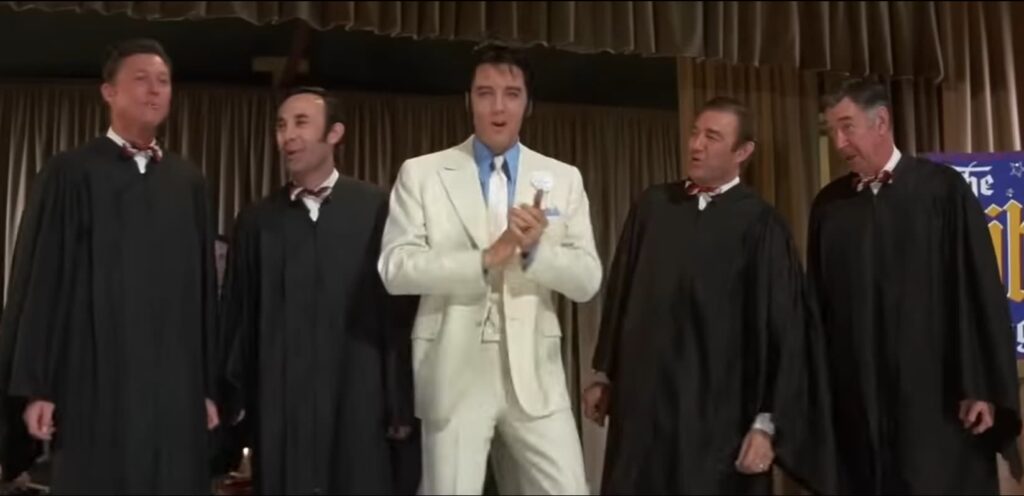
A Heavenly Ride on the Gospel Train: Elvis Presley and the Enduring Power of “Swing Down Sweet Chariot”
There are certain sounds, certain voices, that act as a direct, unfiltered conduit back to a moment in time—a simpler time, perhaps, when the air seemed clearer and the melodies carried a heavier weight of collective hope and shared spiritual fervor. For many of us, that sound is the incomparable voice of Elvis Presley, and few of his recordings capture the earnest, bedrock sincerity of his musical soul quite like his rendition of the classic spiritual, “Swing Down Sweet Chariot.”
This particular song, an indelible part of the American gospel fabric for over a century, found its way into the King’s repertoire on his third gospel album, His Hand in Mine, which was released in November 1960. While it didn’t chart as a single in the same way his pop or rock and roll hits did, the album itself—a heartfelt collection showcasing his deep respect for the genre he always called his first love—was a monumental success, peaking at #5 on the Billboard Top Pop Albums chart. This chart success cemented Elvis as a spiritual force, not just a secular idol. The version that most fondly lingers in the collective memory, however, is often the one featured in his 1969 film, The Trouble with Girls (and subtitled and how to get into it).
The Soul of the Song: Story and Meaning
The story behind “Swing Down Sweet Chariot” is woven into the very history of Black American spirituals. Its core meaning is an exuberant, longing prayer for salvation and the promise of a heavenly afterlife, often using the metaphor of a chariot—a celestial vehicle, akin to the one described taking the prophet Elijah to heaven—swinging low to collect the faithful. The lyric “Swing down sweet chariot, stop and let me ride” isn’t merely a request for transportation; it’s a visceral plea for deliverance from earthly trials and the fulfillment of the Christian promise of glory. It’s a song of profound hope, a testament to faith conquering adversity.
For Elvis, this classic spiritual held a special, personal resonance. Before the fame, before Sun Records and the revolutionary swivel of his hips, the King’s greatest ambition was to sing bass in a gospel quartet. This wasn’t a phase; it was his primal musical instinct. The performance of “Swing Down Sweet Chariot” in The Trouble with Girls provides a unique, almost documentary-style glimpse into this foundational desire.
A Rare and Authentic Performance
The 1969 film scene is special precisely because it strips away some of the cinematic artifice. It presents Elvis on stage, backed by real musicians—a rarity in his later filmography. The last time his movie performance featured real instrumentalists was five years earlier in Viva Las Vegas. In this instance, the backing singers were The Mellomen, a distinguished vocal group Elvis had recorded with previously. They play “The Bible Singers” in the film, a part of the traveling Chautauqua troupe led by Elvis’s character, Walter Hale.
The almost palpable authenticity of this scene, where Elvis stands among other singers, his phenomenal voice intermingling with and supported by the harmonies of the group, presents him as the musician he likely saw himself as before anything else: a singer among singers, connected by the music. It’s a powerful, full-throated, and gloriously rendered performance of a song he had first recorded with such conviction on His Hand in Mine. Listening to it now, you don’t just hear a pop idol fulfilling a contractual obligation; you hear a man reaching back to the deepest, most sacred part of his musical upbringing, offering a glorious, full-throated testimony. It’s a moment of pure, unadulterated gospel soul, capturing the enduring spiritual fire that remained the quiet, magnificent engine room of the King’s legendary career.